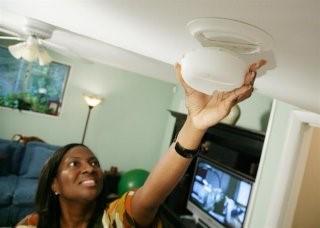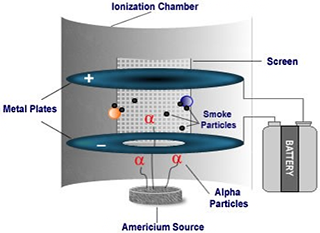How to maintain and dispose of your smoke detector
- The National Fire Protection Association recommends you replace the batteries in every smoke detector twice a year.
- Do not tamper with an ionization smoke detector.
- At the end of their working life, you may throw ionization smoke detectors away in your household garbage.
- Your community may also have a separate recycling program for ionization smoke detectors.
- You may also contact the manufacturer of your detector for other possible disposal and recycling options. For example, First Alert has a program to take back First Alert, BRK, Family Gard, or Onelink brand detectors.

A woman installs a smoke detector in her home. Source: Federal Emergency Management Agency (FEMA)
How recycling facilities can manage ionization smoke detectors
- Recycling centers are permitted to collect smoke detectors in order to divert them from municipal solid waste landfills.
- These facilities may not dismantle or otherwise manipulate the smoke detectors, and the devices must remain intact.
- The recycling center may then transfer the collected smoke detectors to an entity who possesses a specific radioactive materials license, issued by the Nuclear Regulatory Commission or an Agreement State, that authorizes further recycling and eventual disposal.
How ionization smoke detectors work
Ionization smoke detectors use a small amount of radioactive material, americium-241, to detect smoke. Most ionization smoke detectors are exempt from the State of Colorado Rules and Regulations for Radiation Control.
The americium-241 in an ionization smoke detector emits alpha particles continuously to a detector. When enough smoke is present, the detector can no longer detect the alpha particles which then triggers the alarm. Alpha particles do not travel far in air and cannot penetrate the dead layer of skin cells on your body. There is no radiation hazard from using an ionization smoke detector.
